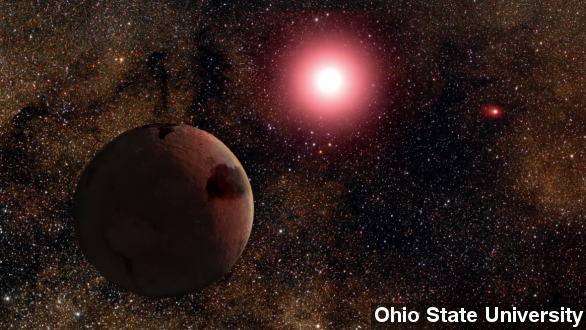It sounds all too familiar — an Earth-like planet has been discovered light-years away. But it seems each discovery is giving scientists more and more insight into other potentially habitable planets and where to find them. (Via NASA)
The newest find is 3,000 light-years away in a binary star system, where two stars very close to each other orbit a common center. (Via The Ohio State University)
This certainly isn't the closest discovery. That title goes to Gliese 832c, a "super-Earth" about five times larger than Earth. As Space.com reports, it's only 16 light-years away.
So where does this planet fall in line with the dozens of other recent Earth-like planet discoveries?
As we reported back in April ...
MATT MORENO: "A new planet announced Thursday might be the earthiest one yet."
... some things astronomers look for in determining an Earth-twin is its size and distance from a star, its orbit around a similar star and a similar atmosphere.
This planet is reportedly twice the mass of Earth and orbits its star at the same distance Earth orbits the sun. Although it sounds like it fits the description of an Earth-twin, it can't exactly be called one. (Via Science Channel)
That's because its host star is much dimmer than our sun, likely making it a frozen planet even colder than Jupiter's moon Europa. (Via NASA)
Still, researchers say the find is important because it's the first evidence that terrestrial planets can actually form in a binary star system, an arrangement thought to make up half the stars in the galaxy.
One researcher explains: "Normally, once we see that we have a binary, we stop observing. The only reason we took such intensive observations of this binary is that we already knew there was a planet. ... In the future we'll change our strategy." (Via The Ohio State University)
So that means we can expect even more Earth-like discoveries to come.


